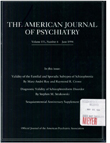Melancholic/endogenous depression and response to somatic treatment and placebo
Abstract
OBJECTIVE: The authors' goals were to examine the effects of somatic treatment and placebo in patients with and without endogenous/melancholic depression. METHOD: Before entry into one of four trials of antidepressant drugs versus placebo, 231 patients were assessed as to whether they met Research Diagnostic Criteria for definite endogenous depression and/or DSM-III criteria for major depressive episode with melancholia. These patients were prospectively assessed for subsequent response to antidepressant treatment or placebo. Previous studies of the effect of endogenous/melancholic depression on treatment response were also reviewed. RESULTS: Of the 76 patients with DSM-III melancholia given active medication, 41 (54%) had a complete or partial response, but only 10 (23%) of the 44 patients with melancholia given placebo had a complete or partial response. Of the 76 depressed patients without melancholia given active medication, 46 (61%) had a complete or partial response, and 15 (43%) of the 35 depressed patients without melancholia given placebo had a complete or partial response. Moderately depressed patients with DSM-III melancholia had a significantly better response to active medication than did severely depressed patients with melancholia and showed the greatest difference between response to active medication and response to placebo. The results of the review of previous studies of the effect of endogenous/melancholic depression on treatment response were mixed. CONCLUSIONS: Depressed patients with melancholia were not particularly different from depressed patients without melancholia in their responses to antidepressant medication but did differ from patients without melancholia in their responses to active medication versus placebo, particularly if their depression was moderate and not severe. This suggests that patients with DSM-III melancholia may be unresponsive to nonsomatic treatments.
Access content
To read the fulltext, please use one of the options below to sign in or purchase access.- Personal login
- Institutional Login
- Sign in via OpenAthens
- Register for access
-
Please login/register if you wish to pair your device and check access availability.
Not a subscriber?
PsychiatryOnline subscription options offer access to the DSM-5 library, books, journals, CME, and patient resources. This all-in-one virtual library provides psychiatrists and mental health professionals with key resources for diagnosis, treatment, research, and professional development.
Need more help? PsychiatryOnline Customer Service may be reached by emailing [email protected] or by calling 800-368-5777 (in the U.S.) or 703-907-7322 (outside the U.S.).



